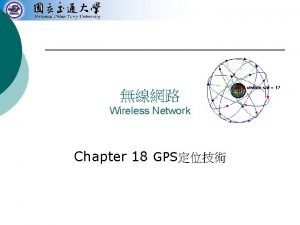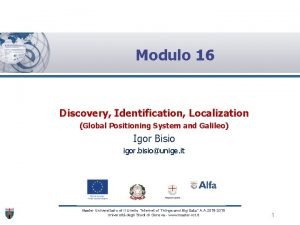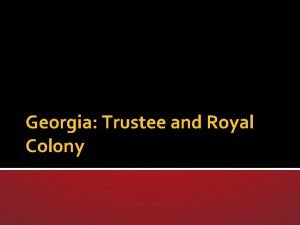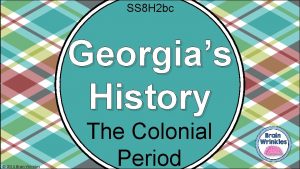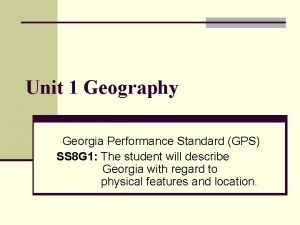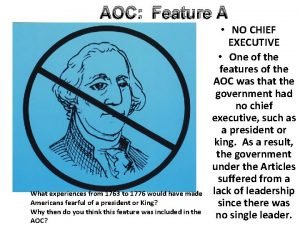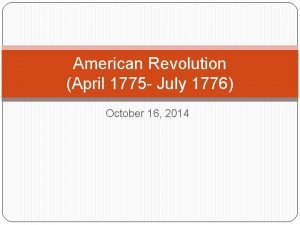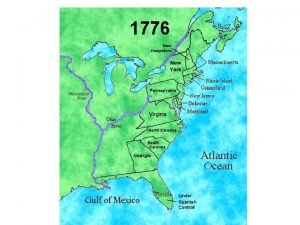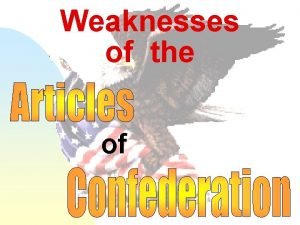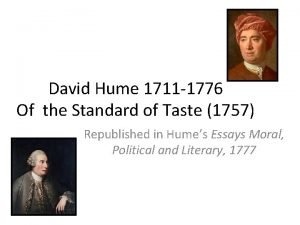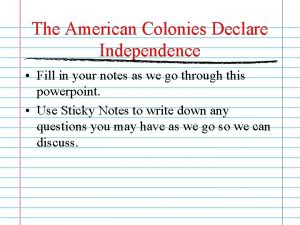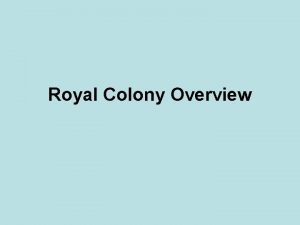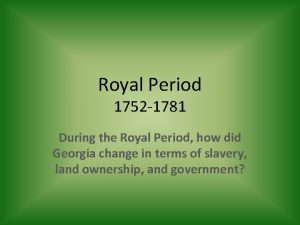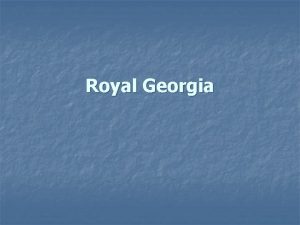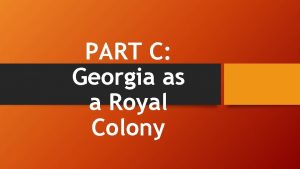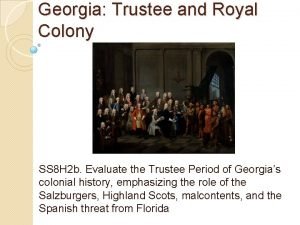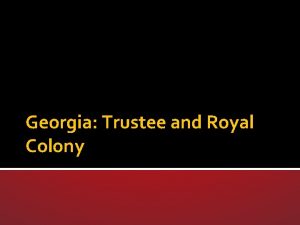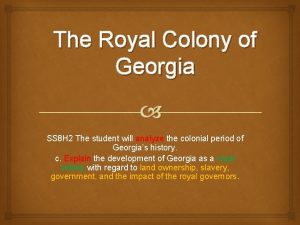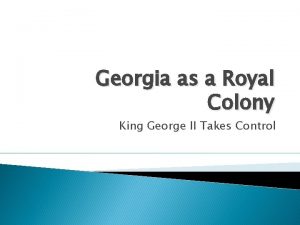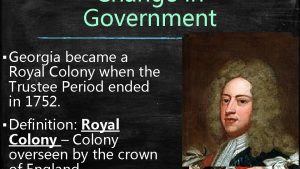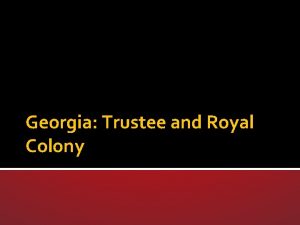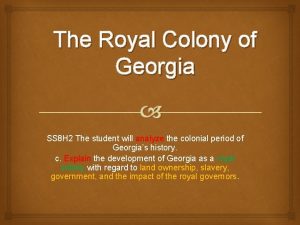Royal Colony Georgia 1752 1776 GPS SS 8

















- Slides: 17

Royal Colony Georgia 1752 -1776 GPS: SS 8 H 2 c Fall 2014 Mrs. West

Let’s Get Started 1) Set-up your paper for Cornell Notes. 2) Write down the following on your paper. Name Social Studies Period 3, 4, 5 or 6 Today’s Date: October 13, 2014

Let’s Get Started 3) Also, write down the Essential Question (E. Q). You should be able to answer this question by the time we finish the notes. E. Q. : How did Georgia become a Royal colony and what effect did this event have on the colonists?

Enduring Understanding Individuals, Groups, Institutions The student will understand that the actions of individuals, groups, and/or institutions affect society through intended and unintended consequences.

Georgia Performance Standard SS 8 H 2 The student will analyze the colonial period of Georgia’s history. c. Explain the development of Georgia as a royal colony with regard to land ownership, slavery, government, and the impact of the royal governors.

Essential Question How did Georgia become a Royal colony and what effect did this event have on the colonists?

Terms to Know Add these 2 terms to your notes. Term #1 Proprietary Colony: A colony governed by a board of trustees, also referred to as a trustee colony. Georgia was a proprietary colony when it was governed by James Oglethorpe and the 21 trustees.

Terms to Know Add these 2 terms to your notes. Term #2 Royal Colony: A colony directly governed by the king. Georgia was a royal colony when it was governed by King George after James Oglethorpe and the trustees left Georgia and returned to England.

Notes Slide #1 You will review this section of the notes to create your own level 2 or 3 question or topic. • James Oglethorpe and the 21 trustees left Georgia. • In 1752, the Georgia colony became a royal colony under the direct rule of King George. • The Charter of 1732 was returned and the colony came under British rule. • The British Parliament had to pass a charter in order for Georgia to become an official Royal Colony. This process took two years. Georgia would not get its first official royal governor until 1754. • The government of Georgia would change drastically as the people, under the leadership of the Royal Governors, would have to learn to govern themselves.

Notes Slide #1 continued You will review this section of the notes to create your own level 2 or 3 question or topic. • Colonists that had left when Georgia was a proprietary colony began to return. • Puritans from South Carolina moved into Georgia. • They bought land in present-day Liberty county. • They brought slaves with them. • Rice and indigo were grown as crops. • A port was built near Sunbury so farmers could ship their crops back to England.

Notes Slide #2

Notes Slide #3 You will review this section of the notes to create your own level 2 or 3 question or topic. • John Reynolds – Georgia’s first royal governor. • Governed from 1754 to 1757. • Governor Reynolds introduced the idea of self-government to the colonists and assisted in the creation of a bicameral (two houses) legislature and the creation of a court system. • Eventually, due to a disagreement between Governor Reynolds and the legislature was sent home. Reynolds tried and failed to rule Georgia himself. • The British Parliament recalled Reynolds in 1757 and said that he was ineffective.

Notes Slide #4 You will review this section of the notes to create your own level 2 or 3 question or topic. • Henry Ellis – Georgia’s second royal governor. • Governed from 1757 -1760. • Governor Ellis tried to learn from the mistakes of John Reynolds. Ellis set up a budget and regulated trade with the Native Americans. • Henry Ellis also worked to increase the size and productivity of the colony of Georgia. By 1759, the population of the colony had increased to over 10, 000, including 3, 600 slaves. • In 1759, Henry Ellis became ill and returned to Great Britain. He was replaced as the governor of Georgia in 1760.

Notes Slide #5 You will review this section of the notes to create your own level 2 or 3 question or topic. • James Wright – Georgia’s third (and last) royal governor. • Governed from 1760 -1776. • During Governor Wright’s term in office the size of Georgia increased. After the French and Indian War ended in 1763, Georgia gained a large amount of land. Governor Wright believed Georgia could be even more profitable for England by allowing farmers (and their slaves) to live and work on this land. • James Wright continued to serve as the Royal Governor of Georgia until the beginning of the American Revolution.

Notes Slide #6 You will review this section of the notes to create your own level 2 or 3 question or topic. • Settlers who came to colony of Georgia during the Trustee Period were limited in the amount of land they could own. • People who came by way of the Trust’s charity were limited to 50 acres of land. People who paid their way could have up to 500 acres of land. • During the Trustee Period of Georgia’s history only men could own or inherit land. Many colonists were angry about this and wanted women to be able to own/inherit land. • As Georgia continued to develop as a Royal Colony citizens were given the opportunity to purchase more land (and use slaves to work the land) and women were allowed to inherit land.

Notes Slide #7 You will review this section of the notes to create your own level 2 or 3 question or topic. • During the beginning of the Trustee Period, Georgia’s state law prohibited slavery (slavery was not allowed). • Wealthy colonists who could afford to buy enslaved people demanded to be allowed to bring them to Georgia. Many farmers believed that in order to compete with neighboring states (like South Carolina) they had to be allowed to own slaves. • Between 1750 and 1775, the number of Africans living in slavery increased from 500 to 18, 000. These slaves had no rights, were not allowed to marry, were not allowed to live where they wanted, and were not allowed to learn to read or write. Slaves who broke these rules were punished, including beatings, whippings, separation from friends and family, and even death.

ROYAL COLONY LAND OWNERSHIP SLAVERY GOVERNMENT • colonists allowed to own and sell more land • only wealthy could own slaves • Royal governors appointed by King • worked on rice plantations • Trustee laws repealed • planters bought more and more land • bi-cameral legislature • changed the economy of Georgia – grew rich • white males with property could vote • large plantations farms with slave labor • social classes developed • border of Georgia increased south to St. Mary’s River and west to Mississippi River • slaves were property and had no rights • colonists had more freedom: self-government • court system to settle disputes
 Gps gps gps
Gps gps gps How does gps work
How does gps work Who governed the royal colony of georgia?
Who governed the royal colony of georgia? Cat rabbit dog weight puzzle answer
Cat rabbit dog weight puzzle answer Compare and contrast trustee period and royal colony
Compare and contrast trustee period and royal colony Similarities between trustee and royal colony
Similarities between trustee and royal colony Compare and contrast trustee period and royal colony
Compare and contrast trustee period and royal colony Coastal plains ga to columbus georgia gps
Coastal plains ga to columbus georgia gps Coastal plains ga to columbus georgia gps
Coastal plains ga to columbus georgia gps What experiences from 1763 to 1776
What experiences from 1763 to 1776 1776
1776 The united states in the caribbean 1776 to 1985
The united states in the caribbean 1776 to 1985 July 16 1776
July 16 1776 1776-1607
1776-1607 July 12 1776
July 12 1776 Timeline of the middle colonies
Timeline of the middle colonies Malcolm budd
Malcolm budd May 1775
May 1775
